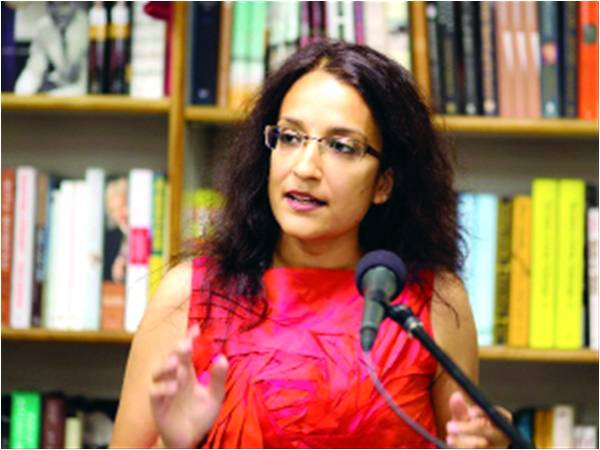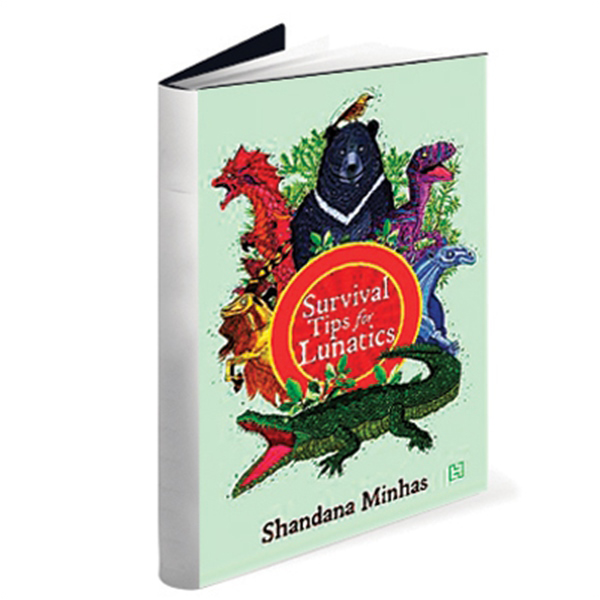
A fire-breathing dragon that incinerates the producers of awful poetry would be a very useful creature indeed, particularly at certain literature festivals where one wishes such fiery vengeance was unleashed at regular intervals. Alas, such a creature exists only within the bitingly funny and tremendously hilarious ‘Survival Tips for Lunatics’ by Shandana Minhas which won the Fiction Prize at the KLF this year.
What a ride Minhas takes us on! Her story took me back to the earliest pleasures of childhood where reading was an exhilarating adventure rather than the chore that it has become with the usual ‘adult’ literature usually deemed worthy of such accolades. The politics of distinguishing between ‘children’s literature’ and its counterpart are a debate for another time. All I will say is that a story that helps children connect with the world and adults connect with their inner child is a treasure trove indeed.

We are introduced to and immediately fall in love with the tongue-in-cheek narrator, Changez Khan; his water-melon guzzling younger brother ‘Timmy,’ or ‘capuchin-monkey-brained snotasaurus’ as his elder sibling lovingly refers to him. The relationship between these two brothers, their incessant bickering that coats their fierce loyalty to each other, is, to my mind, one of the sweetest aspects of the story. Moreover, the excellent illustrations by Sayan Mukherjee manage to enhance the experience of Lunatics by capturing the whimsy of the characters and the bizarreness of the situations they find themselves in.
Minhas is quite the ventriloquist – providing not only the distinct voices of the brothers but also of the various creatures they come across in their adventure in Balochistan, after their parents accidently leave them behind in Hingol National Park. There’s the snippy, no-nonsense, acerbic sparrow (whom Timmy confuses for a golden eagle), the peace-loving, fiercely protective and philosophical zen-spouting Bear, the vain, the unpoetic Chiltan Markhor and of course, Chiraghdin who is the happy resolution to most of crises that the plot keeps stumbling into. The author’s skill lies in the manner in which she weaves information about Balochistan’s topography, history and wildlife into her whirlwind narrative, so that the reader is inadvertently informed while being entertained; and that too about a province which most non-Baloch Pakistanis know regrettably little about.
However, this is not just a frivolous bed-time story that dabbles in neologisms and wordplay (although it would still be pretty entertaining if it were limited to just those.) The deeper issues of wildlife conservation, the violence and dastardliness of Man, the nuclear bombings carried out in the Ras Koh hills in 1998 all form a rather alarming backdrop to this fantastical novel. Some might be concerned that gory realism of child-nappers like Redbeard and protocol-following army men might be too much for the delicate sensibilities of children. But darkness and human evil have always been central in children’s literature. One is inclined to agree with Neil Gaiman when he says, “If you are protected from dark things then you have no protection of, knowledge of, or understanding of dark things when they show up.”
The ultimate message of Lunatics, however, is that human evil can be circumvented by spirit, spunk and strategy of children like the wily Changez who manages, with the help from his wild friends, to outwit the deranged and dimwitted adults who are the most dangerous animals on the planet.
I cannot recommend this book enough – it is a rollicking read and contains a wisdom that children, with their innocence and insight will connect with; and perhaps, so will their parents.
What a ride Minhas takes us on! Her story took me back to the earliest pleasures of childhood where reading was an exhilarating adventure rather than the chore that it has become with the usual ‘adult’ literature usually deemed worthy of such accolades. The politics of distinguishing between ‘children’s literature’ and its counterpart are a debate for another time. All I will say is that a story that helps children connect with the world and adults connect with their inner child is a treasure trove indeed.

Their incessant bickering that coats their fierce loyalty is one of the sweetest aspects of the story
We are introduced to and immediately fall in love with the tongue-in-cheek narrator, Changez Khan; his water-melon guzzling younger brother ‘Timmy,’ or ‘capuchin-monkey-brained snotasaurus’ as his elder sibling lovingly refers to him. The relationship between these two brothers, their incessant bickering that coats their fierce loyalty to each other, is, to my mind, one of the sweetest aspects of the story. Moreover, the excellent illustrations by Sayan Mukherjee manage to enhance the experience of Lunatics by capturing the whimsy of the characters and the bizarreness of the situations they find themselves in.
The author's skill lies in the manner in which she weaves information about Balochistan's topography, history and wildlife into her whirlwind narrative
Minhas is quite the ventriloquist – providing not only the distinct voices of the brothers but also of the various creatures they come across in their adventure in Balochistan, after their parents accidently leave them behind in Hingol National Park. There’s the snippy, no-nonsense, acerbic sparrow (whom Timmy confuses for a golden eagle), the peace-loving, fiercely protective and philosophical zen-spouting Bear, the vain, the unpoetic Chiltan Markhor and of course, Chiraghdin who is the happy resolution to most of crises that the plot keeps stumbling into. The author’s skill lies in the manner in which she weaves information about Balochistan’s topography, history and wildlife into her whirlwind narrative, so that the reader is inadvertently informed while being entertained; and that too about a province which most non-Baloch Pakistanis know regrettably little about.
However, this is not just a frivolous bed-time story that dabbles in neologisms and wordplay (although it would still be pretty entertaining if it were limited to just those.) The deeper issues of wildlife conservation, the violence and dastardliness of Man, the nuclear bombings carried out in the Ras Koh hills in 1998 all form a rather alarming backdrop to this fantastical novel. Some might be concerned that gory realism of child-nappers like Redbeard and protocol-following army men might be too much for the delicate sensibilities of children. But darkness and human evil have always been central in children’s literature. One is inclined to agree with Neil Gaiman when he says, “If you are protected from dark things then you have no protection of, knowledge of, or understanding of dark things when they show up.”
The ultimate message of Lunatics, however, is that human evil can be circumvented by spirit, spunk and strategy of children like the wily Changez who manages, with the help from his wild friends, to outwit the deranged and dimwitted adults who are the most dangerous animals on the planet.
I cannot recommend this book enough – it is a rollicking read and contains a wisdom that children, with their innocence and insight will connect with; and perhaps, so will their parents.

